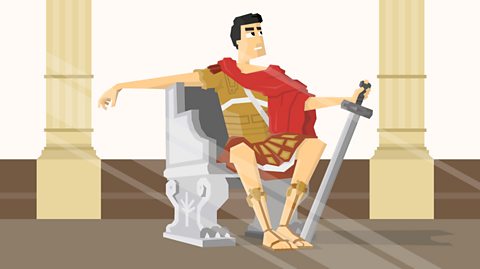Watch: How the Romans changed Britain
When the Romans arrived in AD43, they introduced new ideas and new ways of living to Britain.
From stinging nettles to sewers - find out how the Romans changed Britain
What did the Romans do for us? When the Romans invaded in AD43, they really liked Ancient Britain, but they werenтt too impressed with the Ancient Britons.
The Romans pretty much thought they were better at everything; they built big brick and stone buildings with central heating. They built sewage systems and paved, straight roads that stretched right across the country to connect up all their new Roman towns.
Before long, theyтd built so much that Britain didnтt look too different from Rome itself apart from the weather of course. The Romans even brought animals, like rabbits to Britain. And stinging nettles too! The Romans also built temples to worship their many gods т like Mars, Jupiter, Mercury and Venus.
Youтve probably heard of them, because weтve named our planets after them. Later on, the Romans decided to believe in just one god and introduced Christianity to Britain too.
Before the Romans arrived there was no written language in Britain. They changed all that by teaching important Britons how to read and write and how to speak the Roman language т Latin. And even today, two thousand years later, a lot of our words come from Latin, like тenormousт and тvictoryт and тlavatoryт!
The ways we measure distances miles feet and inches т thatтs all Roman, Weтve got Roman numerals, which you can still see in a lot of places, like clocks. And coins too the Romans made using coins to buy things popular throughout the whole of Roman Britain, rather than just swapping one thing for another like a sheep for a sword for example.
All in all we owe a lot to the Romans т but donтt tell them that т theyтre smug enough as it is.
What happened when the Romans left?
By AD410 the city of Rome was under attack and the empire was falling apart. So the Romans had to leave Britain to help back home.
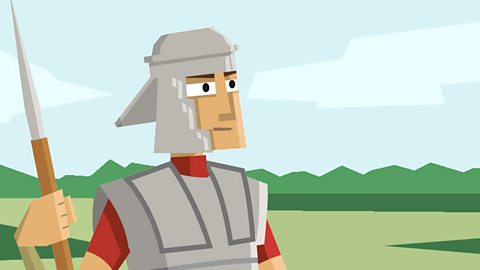
After they left, many of the Roman towns in Britain crumbled away as people went back to living in the countryside.
But even after they were gone, the Romans left their mark all over the country.
- They gave us: new towns, plants, animals, a new religion and new ways of reading and counting.
- Even the word Britain comes from the Romans.
This wasn't all the Romans gave Britain thoughтІ
Roman Roads
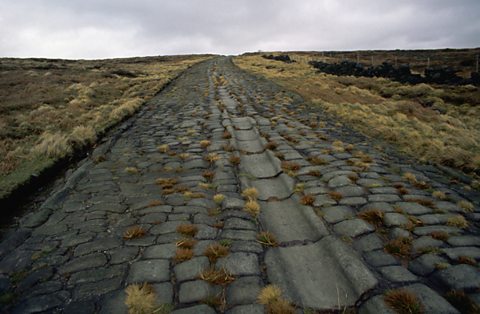
The Romans built 10,000 miles of road across Britain.
Many of these are used today as modern roads.
Fosse Way which went from the Roman towns of Lincoln to Exeter.
Today, this is the A46 to Leicester.

British towns and cities
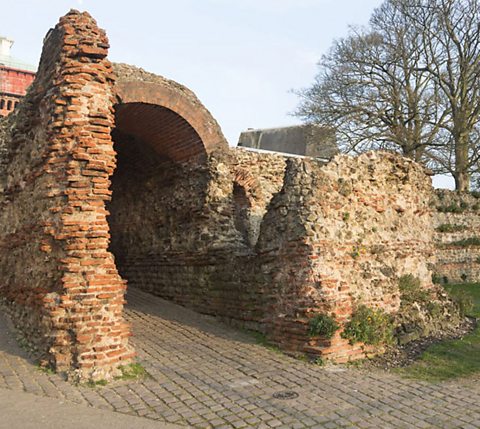
- London (Londinium) was Britainтs greatest city and is today the capital of the UK.
What's in a name?
- If a place-name has chester, caster or cester in it, it's almost certainly Roman.
- Gloucester, Worcester, Colchester, Doncaster and Manchester are good examples.
- Other important Roman towns included Lincoln, Exeter, York, and Bath.
Clever town layouts
- Towns are designed in aтЏgrid. Streets criss-crossed the town to form blocks called insulae.
- In the middle was the forum. A big market square where people came to trade.

Roman places in Britain you can still see
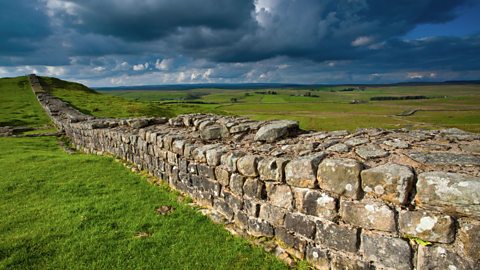
- Of all the Roman remains in Britain, Hadrian's Wall is probably the most famous.
- In AD122 the Emperor Hadrian ordered his soldiers to build a wall between Roman Britain and Scotland.
- It ran for 73 miles from Wallsend-on-Tyne to Bowness.
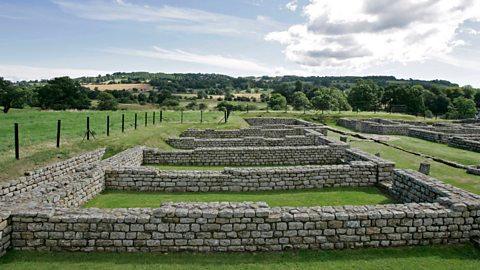
- Chester fort was built around AD123 and the Romans called it тCilurumт.
- Soldiers who lived here would have served on Hadrianтs Wall.
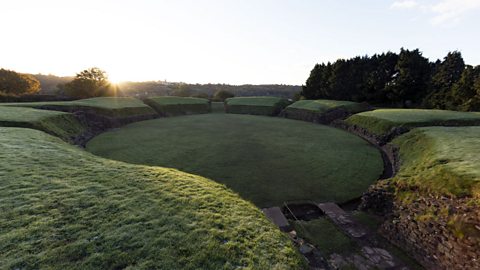
- Caerleon is the site of a 1st century fort the Romans called тIscaт. Archaeologists have uncovered barracks and a bathhouse inside.
- There was also a nearby harbour and this amphitheatre, where soldiers were entertained by gladiator fights.

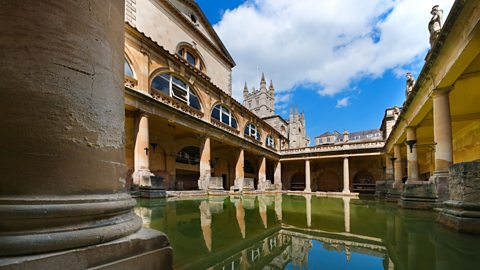
- People came to the baths to get fit, get clean and meet friends.
- The Romans realised it was a good place for a warm dip, because the water is naturally heated by the rocks deep below the ground.
Language, writing and numbers
Before the Romans came, very few Britons could read or write. Instead, information was usually passed by word of mouth.
- They spoke Latin, and it wasnтt long before some Britons started to use it too.
- We've got words and phrases today that come from Latin. Words like exit, which means he or she goes out.
- Our coins are based on a Roman design. Written around some ТЃ1 coins is the Latin phrase 'decus et tutamen' which means glory and protection.
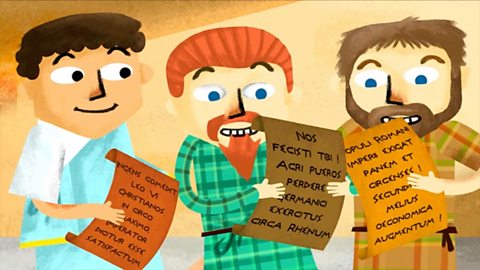
Activity: How the Romans changed Britain quiz
Bitesize Primary games. gameBitesize Primary games
Play fun and educational primary games in science, maths, English, history, geography, art, computing and modern languages.

More on Roman Britain
Find out more by working through a topic
- count1 of 8
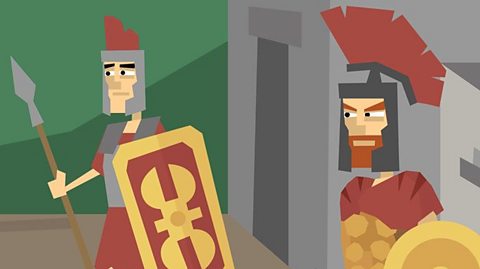
- count2 of 8
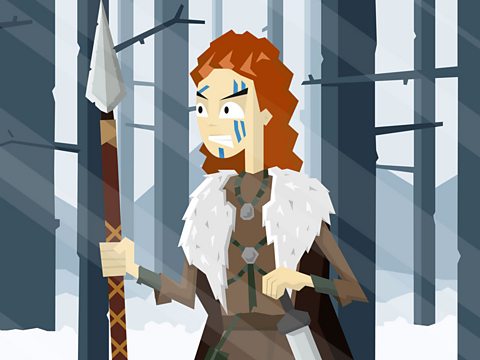
- count3 of 8
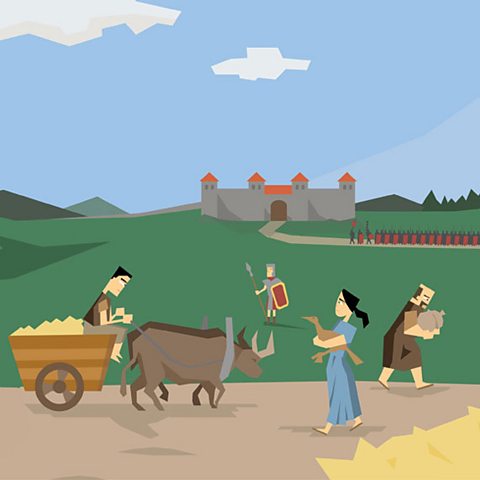
- count4 of 8
